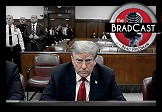 On Friday, ABC's George Stephanopoulos caught Republican Presidential nominee Mitt Romney speaking out of both sides of his mouth. (Not that it's all that hard to do.)
On Friday, ABC's George Stephanopoulos caught Republican Presidential nominee Mitt Romney speaking out of both sides of his mouth. (Not that it's all that hard to do.)
As TPM's Josh Marshall described the remarks --- tongue only somewhat in cheek --- "Romney Apologizes to Muslim Rioters".
Romney, over the course of his lengthy ABC interview, finally acknowledged that the statement issued by the Cairo Embassy condemning "the continuing efforts by misguided individuals to hurt the religious feelings of Muslims --- as we condemn efforts to offend believers of all religions" was made before the protests began.
However, the GOP candidate, who had shamelessly seized upon that statement to falsely accuse the Embassy and President Obama of having "sympathize[d] with those who waged the attacks," evaded a direct answer to Stephanopoulos' direct question: "Where do they show sympathy for those who waged the attacks?"
Instead, Romney insisted it was "inappropriate" for the Cairo Embassy to leave the statement up on its website after its wall was breached. "The statement was reiterated after they had breached the sovereignty of the embassy," Romney proclaimed.
After its wall was breached, the Cairo Embassy tweeted: "This morning's condemnation (issued before protest began) still stands. As does our condemnation of unjustified breach of the Embassy."
Without explaining why he felt it was inappropriate for the Embassy to retain its condemnation of the film's scurrilous slander of the prophet Muhammad while simultaneously condemning the "unjustified breach of the Embassy," Romney followed up with a criticism of the film that was virtually indistinguishable from that which had been initially issued by the Cairo Embassy...
Romney defense underscores his bad faith
After Romney finally acknowledged that the U.S. Embassy in Cairo released its statement "before they breached the wall," Stephanopoulos pressed the issue.
ROMNEY: Well, the statement as I indicated stayed on the website for some 14-15 hours. The statement was reiterated after they had breached the sovereignty of the embassy.
STEPHANOPOULOS: Coupled with a condemnation–
ROMNEY: Even–and even–
STEPHANOPOULOS: –of the attacks, though.
ROMNEY: And even after the killing in Libya. And by the way what I said was exactly the same conclusion the White House reached...
STEPHANOPOULOS: They didn’t say that it was showing sympathy for the attackers.
ROMNEY: Well, I think the statement was an inappropriate statement. I think it should have been taken down. And apparently the White House felt the same way.
STEPHANOPOULOS: So no regrets?
ROMNEY: Well, I indicated, at the time, and continue to that what was said at that time was not appropriate, that they continued to have that. They reiterated the statement after the then breaching of the grounds. And I think that was wrong. And by the way my statement was the same point, which was that the White House said they distanced themself [sic] from the statement. I also thought it was an inappropriate statement. I made the statement --- my point at the same time, I think, the White House did.
Note that Romney never identified why he believed it "inappropriate" for the Cairo Embassy to issue a statement condemning a scurrilous assault on beliefs strongly held by some 1.6 billion Muslims --- approximately 23% of the world's population. He offers only that, well the White House shared his view that the statement was inappropriate.
But, if, as Romney claimed, the White House disagreed with the statement "at the same time" he, Romney, did, why is it that he sought to attribute that statement to the White House?
In truth, the Cairo Embassy statement, which had never been cleared with the White House or the State Department, was posted on twitter by Larry Schwarz, the Cairo Embassy's public affairs director, after it had been rejected by the State Department.
No First Amendment violation
Before turning to what Romney had to say about the film itself, it is important to reiterate that, contrary to the misguided beliefs of so many on the right, like Sara Palin, a government official does not violate the First Amendment rights of a filmmaker by criticizing the content of their film. The First Amendment prevents censorship and the criminalization of speech. It does not shield those who engage in reckless incitements from criticism --- irrespective of whether that criticism comes from government officials, the press or other citizens.
Thus, while it may have been inappropriate for Schwartz to ignore a directive from his superiors at the State Department, his criticism of an anti-Muslim slander --- that had been reportedly written by Egyptian born, Coptic Christian filmmaker and propagandist, Nakoula Basseley Nakoula (while Nakoula was serving time in a federal prison for banking fraud) --- in no way violated Nakoula's right to free speech.
After all, it was Schwartz and his fellow Embassy employees who had been placed in harm's way by Muslim outrage purposely sparked by a twice-convicted felon who told an AP reporter that he made the film because "he considered Islam a cancer" and that "the film was intended to be a provocative political statement."
Romney offers nearly identical condemnation of anti-Muslim film
Here is the complete statement released by the U.S. Embassy in Cairo, which sparked Romney's initial attack on Obama:
It is nothing short of astounding then that Romney would follow his insistence that it was "inappropriate" for Embassy personnel to condemn this reckless incitement by uttering a nearly identical condemnation of the film during his interview with Stephanopoulos. Yet, that is precisely what he did...
ROMNEY: Well, I haven’t seen the film...I think it’s dispiriting sometimes to see some of the awful things people say. And the idea of using something that some people consider sacred and then parading that out a negative way is simply inappropriate and wrong. And I wish people wouldn’t do it. Of course, we have a First Amendment. And under the First Amendment, people are allowed to do what they feel they want to do. They have the right to do that, but it’s not right to do things that are of the nature of what was done by, apparently this film.
STEPHANOPOULOS: We’ve seen General Martin Dempsey call Pastor Jones to say, "Please don’t promote this film." You think that’s a good idea?
ROMNEY: I think the whole film is a terrible idea. I think him making it, promoting it showing it is disrespectful to people of other faiths. I don’t think that should happen.
As Benjy Sarlin notes at TPM, by way of side-by-side comparison with U.S. Sec. of State Hilary Clinton's own remarks about the film, made after both the attack on the Cairo Embassy and the killings at the U.S. Consulate in Benghazi, Romney's comments on ABC were virtually identical to those of the Administration.
So, Mr. Romney, by your logic, by stating that the film was "inappropriate and wrong," would it be fair to say that you have "sympathized" with those who attacked our diplomatic missions?
If not, when will you man up and apologize to the President, the Cairo Embassy and the People of the United States for your scurrilous claim that any of them had "sympathized" with the attackers?
Ernest A. Canning has been an active member of the California state bar since 1977. Mr. Canning has received both undergraduate and graduate degrees in political science as well as a juris doctor. He is also a Vietnam vet (4th Infantry, Central Highlands 1968). Follow him on Twitter: @Cann4ing.


 Trump's Ridiculous 'Immunity' Case Heard by Corrupted SCOTUS: 'BradCast' 4/25/24
Trump's Ridiculous 'Immunity' Case Heard by Corrupted SCOTUS: 'BradCast' 4/25/24 'Green News Report' 4/25/24
'Green News Report' 4/25/24
 NY Trump Trial Mid-Week Ketchup: 'BradCast' 4/24/24
NY Trump Trial Mid-Week Ketchup: 'BradCast' 4/24/24 'Election Fraud, Pure and Simple': 'BradCast' 4/23/24
'Election Fraud, Pure and Simple': 'BradCast' 4/23/24 'Green News Report' 4/23/24
'Green News Report' 4/23/24 'First Domino Falls' in UAW Effort to Unionize the South: 'BradCast' 4/22/24
'First Domino Falls' in UAW Effort to Unionize the South: 'BradCast' 4/22/24 Sunday 'Popcorn Ready' Toons
Sunday 'Popcorn Ready' Toons Bad Climate News for Home, Car Owners; Good Labor News for Workers in the South: 'BradCast' 4/18/24
Bad Climate News for Home, Car Owners; Good Labor News for Workers in the South: 'BradCast' 4/18/24 'Green News Report' 4/18/24
'Green News Report' 4/18/24 SCOTUS Suddenly Worried About Overcriminalization ... for J6 Insurrectionists: 'BradCast' 4/17/24
SCOTUS Suddenly Worried About Overcriminalization ... for J6 Insurrectionists: 'BradCast' 4/17/24 'Trump Media' Plummeting, MAGA Buyers Losing Life Savings: 'BradCast' 4/16/24
'Trump Media' Plummeting, MAGA Buyers Losing Life Savings: 'BradCast' 4/16/24 'Green News Report' 4/16/24
'Green News Report' 4/16/24 Trump's First Criminal Trial, for Cheating in 2016, Begins in NY: 'BradCast' 4/15/24
Trump's First Criminal Trial, for Cheating in 2016, Begins in NY: 'BradCast' 4/15/24 Sunday 'Party Like It's 1864' Toons
Sunday 'Party Like It's 1864' Toons Biden Closes 'Gun Show Loophole'; Repubs Turn Desperate: 'BradCast' 4/11/24
Biden Closes 'Gun Show Loophole'; Repubs Turn Desperate: 'BradCast' 4/11/24 'Green News Report' 4/11/24
'Green News Report' 4/11/24 'Pink Slime': Fake 'Local News' Sites Proliferating in Advance of Election: 'BradCast' 4/10/24
'Pink Slime': Fake 'Local News' Sites Proliferating in Advance of Election: 'BradCast' 4/10/24 Dirty Tricks and the Dirtiest Candidate Of All Time: 'BradCast' 4/9/24
Dirty Tricks and the Dirtiest Candidate Of All Time: 'BradCast' 4/9/24 'Titanic Law' Reform Just Tip of Iceberg in Quest for Key Bridge Accountability: 'BradCast' 4/8/24
'Titanic Law' Reform Just Tip of Iceberg in Quest for Key Bridge Accountability: 'BradCast' 4/8/24 Trump's Very Bad Day in Court(s), Other Good (& Less Good) News: 'BradCast' 4/424
Trump's Very Bad Day in Court(s), Other Good (& Less Good) News: 'BradCast' 4/424 WI Supremes May Restore Drop-Box Voting
WI Supremes May Restore Drop-Box Voting WI Voters Approve Election Crippling Ballot Measures: 'BradCast' 4/3/24
WI Voters Approve Election Crippling Ballot Measures: 'BradCast' 4/3/24 Politico's Josh Gerstein Owes a Retraction
Politico's Josh Gerstein Owes a Retraction More GOP Election Fraud; Overdue Justice for Crystal Mason: 'BradCast' 4/2/24
More GOP Election Fraud; Overdue Justice for Crystal Mason: 'BradCast' 4/2/24
 VA GOP VOTER REG FRAUDSTER OFF HOOK
VA GOP VOTER REG FRAUDSTER OFF HOOK Criminal GOP Voter Registration Fraud Probe Expanding in VA
Criminal GOP Voter Registration Fraud Probe Expanding in VA DOJ PROBE SOUGHT AFTER VA ARREST
DOJ PROBE SOUGHT AFTER VA ARREST Arrest in VA: GOP Voter Reg Scandal Widens
Arrest in VA: GOP Voter Reg Scandal Widens ALL TOGETHER: ROVE, SPROUL, KOCHS, RNC
ALL TOGETHER: ROVE, SPROUL, KOCHS, RNC LATimes: RNC's 'Fired' Sproul Working for Repubs in 'as Many as 30 States'
LATimes: RNC's 'Fired' Sproul Working for Repubs in 'as Many as 30 States' 'Fired' Sproul Group 'Cloned', Still Working for Republicans in At Least 10 States
'Fired' Sproul Group 'Cloned', Still Working for Republicans in At Least 10 States FINALLY: FOX ON GOP REG FRAUD SCANDAL
FINALLY: FOX ON GOP REG FRAUD SCANDAL COLORADO FOLLOWS FLORIDA WITH GOP CRIMINAL INVESTIGATION
COLORADO FOLLOWS FLORIDA WITH GOP CRIMINAL INVESTIGATION CRIMINAL PROBE LAUNCHED INTO GOP VOTER REGISTRATION FRAUD SCANDAL IN FL
CRIMINAL PROBE LAUNCHED INTO GOP VOTER REGISTRATION FRAUD SCANDAL IN FL Brad Breaks PA Photo ID & GOP Registration Fraud Scandal News on Hartmann TV
Brad Breaks PA Photo ID & GOP Registration Fraud Scandal News on Hartmann TV  CAUGHT ON TAPE: COORDINATED NATIONWIDE GOP VOTER REG SCAM
CAUGHT ON TAPE: COORDINATED NATIONWIDE GOP VOTER REG SCAM CRIMINAL ELECTION FRAUD COMPLAINT FILED AGAINST GOP 'FRAUD' FIRM
CRIMINAL ELECTION FRAUD COMPLAINT FILED AGAINST GOP 'FRAUD' FIRM RICK SCOTT GETS ROLLED IN GOP REGISTRATION FRAUD SCANDAL
RICK SCOTT GETS ROLLED IN GOP REGISTRATION FRAUD SCANDAL VIDEO: Brad Breaks GOP Reg Fraud Scandal on Hartmann TV
VIDEO: Brad Breaks GOP Reg Fraud Scandal on Hartmann TV RNC FIRES NATIONAL VOTER REGISTRATION FIRM FOR FRAUD
RNC FIRES NATIONAL VOTER REGISTRATION FIRM FOR FRAUD EXCLUSIVE: Intvw w/ FL Official Who First Discovered GOP Reg Fraud
EXCLUSIVE: Intvw w/ FL Official Who First Discovered GOP Reg Fraud GOP REGISTRATION FRAUD FOUND IN FL
GOP REGISTRATION FRAUD FOUND IN FL


































